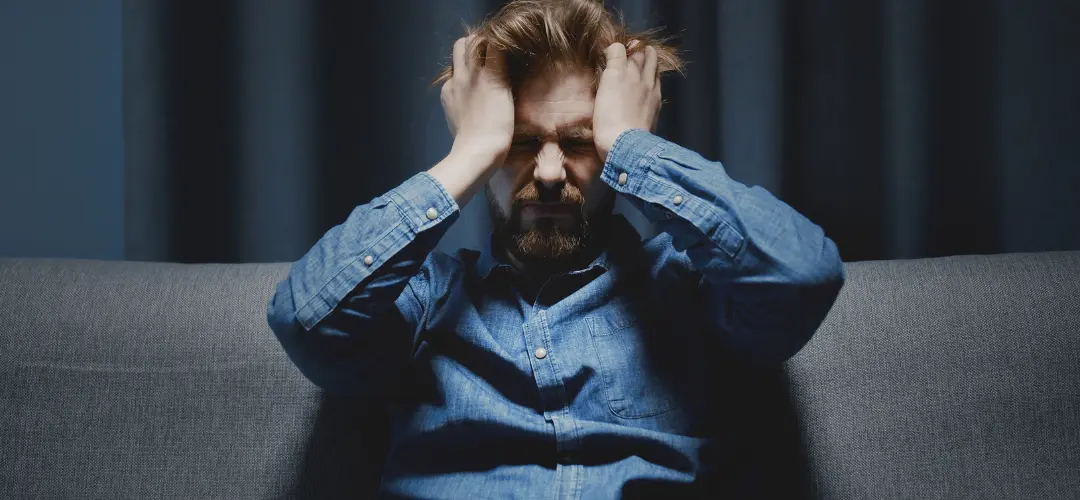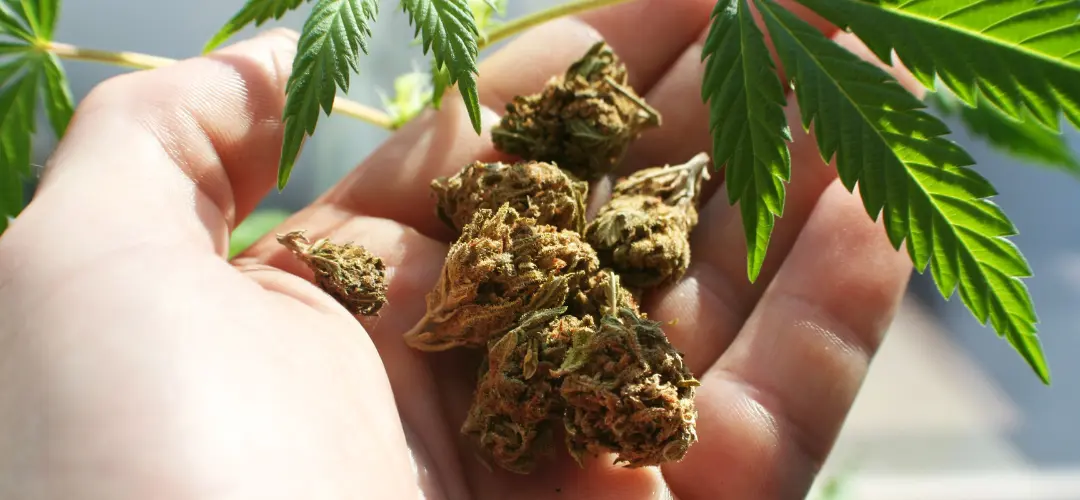The Timeline for Cannabis Withdrawal Symptoms
Marijuana use often starts out innocently. You might puff on a joint at a party or use it to unwind at night. Unfortunately, this occasional use can spiral into a daily habit.
Once you’ve reached that point, it might be hard to feel “normal” unless you are under the influence. This is what dependence looks like.
Unfortunately, when you try to quit a cannabis habit, there’s a risk of withdrawal symptoms like night sweats, anxiety, loss of appetite, and trouble sleeping.
You may find yourself wondering, “How long do marijuana withdrawal night sweats last?” and “Can I outlast these uncomfortable symptoms and break free of the hold that weed has on my life?”
Yes, you can – but that starts with knowing what to expect and when the symptoms of cannabis withdrawal will end. Keep reading to learn more about weed withdrawal symptoms, the timeline, and when to reach out to South Shores for support during detox and recovery.
What Causes Cannabis Withdrawal Night Sweats?
Any time that you use a substance for an extended period, it can cause withdrawal symptoms when you suddenly stop. This happens because your body (and mind) become dependent on that substance to feel “normal”.
And excessive sweating is a common withdrawal symptom that can happen if you suddenly stop smoking marijuana. This is most likely to happen at night when your body is hard at work fighting bacteria, flushing toxins, and healing your body.
When you quit using weed, you will likely sweat more at night as your body responds to depleting levels of THC, the active compound in marijuana. Sweating happens as your body metabolizes and eliminates THC stored in fat cells.
Another factor is that THC interacts with the endocannabinoid system. The endocannabinoid system plays a role in temperature regulation, possibly making you feel hotter at night.
These night sweats due to marijuana can also keep you up at night, along with a lack of sleep that often accompanies cannabis withdrawals.
How Long Do Night Sweats from Cannabis Withdrawal Last?
Night sweats may last as long as it takes your body to reach homeostasis, which is a state of balance for your body.
This lasts weeks for some people and months for others depending on your metabolism, how frequently you use marijuana, and your overall health.
Other Common Cannabis Withdrawal Symptoms

Unfortunately, excessive nighttime sweating is one of several uncomfortable withdrawal symptoms that you may experience after quitting weed.
Other common symptoms of weed withdrawal, sometimes called cannabis withdrawal syndrome, include:
- Digestive upset including nausea, stomach pains, diarrhea, and vomiting
- Reduced appetite
- Headaches
- Sore, achy muscles
- Increased heart rate
- Tremors
- Intense cravings for marijuana or other drugs
- Difficulty concentrating
- Troubles falling asleep and other sleep problems
- Vivid and disturbing dreams
- Irritability
- Depression
- Anxiety
- Mood swings
In addition to these more common withdrawal symptoms, some people experience delusions or psychosis. Often, this happens in people who have a genetic predisposition to certain psychiatric disorders, including schizophrenia.
In most cases, these symptoms are not life-threatening, but should thoughts of self-harm occur, please reach out immediately for mental health support.
How Long Do Physical Symptoms of Weed Withdrawals Last?
The onset of symptoms after you quit smoking weed varies. In the case of chronic, long-term marijuana abuse, some symptoms can start hours after their last use.
Typically, muscle aches, tremors, night sweats, and other symptoms persist for 3 days up to a week after quitting cannabis. They are worst in this period with severity decreasing over time, but this can vary based on your level of marijuana dependence.
Symptoms start to subside after the first week or two, but some people also experience mild discomfort for a few weeks. Physical symptoms that last longer include poor sleep quality from sleep disturbances and cravings.
How Long Do Psychological Marijuana Withdrawal Symptoms Last?
Chronic cannabis use has negative consequences for mental health that can last several weeks, months, or even longer after quitting cannabis. Psychological symptoms like irritability, anxiety, and depression are most common, though some people experience psychosis.
For people with untreated depression, anxiety, or trauma, quitting marijuana might make mental health symptoms return. It’s not uncommon for people developing depression or anxiety to feel discouraged about getting sober.
Managing these underlying conditions will be an important part of overcoming cannabis abuse.
Factors Affecting the Marijuana Withdrawal Timeline and Symptoms
People who only smoke a few times each month might not experience any symptoms after quitting weed. By contrast, heavy users typically have more intense symptoms than moderate smokers.
Your body composition, metabolism, and overall health also play a role in the substance withdrawal timeline.
4 Ways of Managing Night Sweats from Cannabis Withdrawal

Night sweats are a common symptom of withdrawal during recovery from marijuana dependence. They disrupt the body’s sleep cycle, making it hard for your body to reach a state of homeostasis after weed withdrawal.
Many people who experience withdrawal symptoms like mood swings, disrupted sleep, and night sweats after quitting weed are tempted to use it again, just to relieve symptoms. These tips can help relieve night sweats when you stop smoking pot.
1) Practice Good Sleep Hygiene
Good sleep hygiene includes a consistent sleep routine, avoiding caffeine before bed, and trying to go to bed and wake up near the same time each day. These habits support healthy sleep critical for the detox process.
A routine or technique that helps relax the central nervous system can also be helpful, especially if you typically use cannabis before bed. This might involve a hot bath, deep breathing, guided meditation, yoga, or reading a book.
2) Keep Things Cool While Sleeping
Keeping your sleeping environment cool may not make night sweats go away completely, but they can cool you down and reduce excessive sweating. Sleeping in a cool room is a good place to start.
You should also choose light, breathable materials for your bedding and clothes. Be sure clothing is light and loose. If all these strategies do not work, especially if sleep quality is so poor it affects day-to-day functioning, it can be helpful to seek medical advice on how to get enough sleep during weed withdrawal.
3) Support Your Body Through Detox
Proper nutrition, hydration, and sleep all benefit the detox process. The right foods fuel your body, while water helps eliminate THC and toxins. Proper sleep also aids in the detoxification process.
As an added benefit, these things become habits that also support recovery. Following a schedule, being physically active, taking care of responsibilities, self-care, and doing things you enjoy are all a part of this.
4) Detoxing from Marijuana in a Treatment Facility
If you are dealing with intense physical and psychological symptoms after quitting weed, it’s sometimes helpful to detox at a facility like South Shores.
During medical detox with us, you’ll be monitored by a medical professional through the marijuana withdrawal process who offers guidance and medical assistance. They may prescribe medication depending on the cannabis withdrawal severity.
Our facilities are located in Dana Point and San Juan Capistrano, CA, sitting near beautiful beaches. This peaceful, safe environment sets the tone for treatment. In addition to beautiful views, you can expect high-quality programs and an environment that provides high levels of physical and emotional support during recovery from substance abuse.
Our clients partake in individual and group therapy sessions that teach skills for success. You’ll also enjoy recreational activities like surf therapy, yoga, and meditation on the beach, work to establish a healthy routine, and receive nutritional support.
Seeking Treatment for a Marijuana Use Disorder

Cannabis isn’t considered as addictive as harder substances like stimulants or opioids. For people who start young, however, or those who have been using marijuana for years, there’s a risk of developing cannabis use disorder.
Marijuana use disorder is as serious as other types of drug abuse because it still affects motivation, relationships, finances, and your ability to reach your goals.
Using cannabis can cause problems at work and with the law, especially if you are using it at times when you shouldn’t be.
If you’ve tried to quit unsuccessfully in the past, it may be a sign that you need help. That’s what South Shores is here for. Through our inpatient services and outpatient treatment programs, even chronic users can develop the skills necessary to fight back against addiction.
The Importance of Dual Diagnosis Treatment for Cannabis Consumers
For some people, marijuana use starts with occasional use before becoming a habit. It’s used for relaxation or to unwind at the end of a stressful day.
Others, however, might use marijuana to cope with anxiety, depression, unresolved trauma, or other mental health conditions.
In instances where marijuana users have co-occurring mental health and substance use disorders, treating both conditions is essential for lasting sobriety and a better quality of life. Working with a healthcare professional to treat chronic pain or physical health problems is also important.
At South Shores Recovery, you’ll be able to work with a mental health professional to determine the best course of treatment for these conditions, so you no longer have to rely on marijuana.
Get Help Overcoming Marijuana Withdrawal Symptoms at South Shores
It does not matter if you have been smoking for weeks, months, or years, it is possible to quit marijuana for good. You CAN make it through weed withdrawal, break that physical and mental dependence, and change your life for the better.
If you need help managing night sweats, cravings, tremors, and other withdrawal symptoms, talk to our caring staff at South Shores today.
We are waiting by the phone to answer questions you might have about marijuana treatment, weed withdrawal symptoms, or the detox process.
Please reach out confidentially today.


Recent Comments